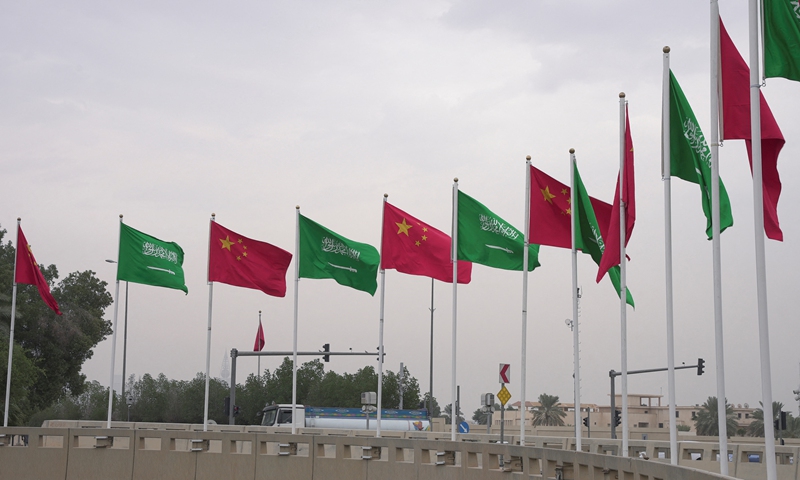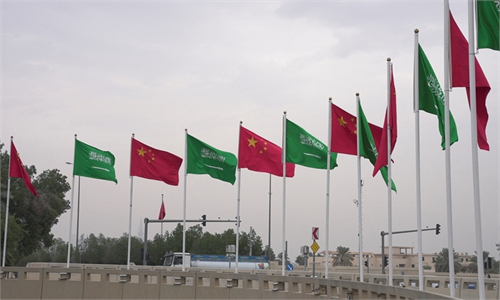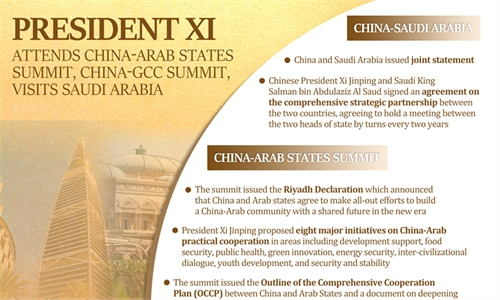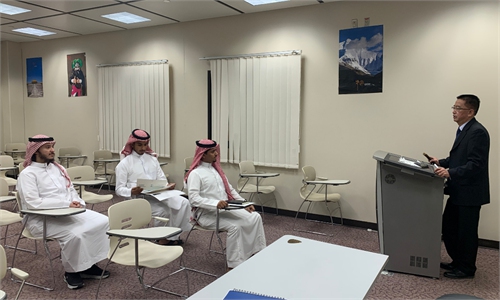Points of convergence between the Belt and Road Initiative and the Saudi Vision 2030

The national flags of China and Saudi Arabia are seen on the street of Riyadh ahead of the China-Arab States Summit on December 7, 2022. Photo: thepaper.cn
The Belt and Road Initiative is an ambitious Chinese initiative that aims to connect China with the world through infrastructure that will be the largest in the history of the world. China was inspired by the historical Silk Road. Chinese President Xi Jinping's initiative was unveiled in 2013. The Belt and Road Initiative has focused on investing in infrastructure, railways, energy, ports and airports.The goals of the Belt and Road Initiative include enhancing economic cooperation; developing infrastructure and roads; encouraging trade and investment; facilitating currency conversion; supporting the process of cultural exchange between peoples; strengthening international maritime connectivity and scientific and environmental research.
The Saudi Vision 2030 depends on weaning the Saudi economy away from its dependence on oil derivatives, in addition to diversifying the economy and improving investment in the public services sector, such as developing infrastructure and tourism, and improving means of recreation and entertainment, based on the Kingdom's religious status in addition to its strategic location linking three continents.
As of August 2022, 149 countries and 32 international organizations have signed Belt and Road Initiative cooperation agreements with China. In 2021, China' trade in goods with the BRI countries totaled 11.6 trillion yuan ($1.7 trillion), a new high over the past eight years and a year-on-year increase of 23.6 percent. The integration of the Belt and Road Initiative with the Kingdom's Vision 2030 can help achieve the development goals of both countries, especially when the Gulf Cooperation Council countries are looking for stronger cooperation with China, a market with great potential.
The Crown Prince and Prime Minister Mohammed bin Salman Al Saud has played a major role in supporting Saudi Arabia's pivotal role in the Belt and Road Initiative.
Saudi Arabia has also taken steps toward reviving the Saudi Silk Road project in the Jizan region as one of the new economic arms of the Kingdom that contributes to attracting many foreign investments.
Saudi Arabia plays a pivotal and prominent role in the project, as it considers the economic belt of the Silk Road as a supply center in view of the road countries' need for energy, especially electricity, which contributes to the creation of a new economic system for the Kingdom that can help develop many regions of the Kingdom and is compatible with Vision 2030 in terms of political and security stability in the region.
The Kingdom has encouraged increasing the production power of its industry, which is one of the goals of Vision 2030, and established new petrochemical factories in the city of Jizan as a logistical area for the new Silk Road.
Saudi Arabia has achieved strong and effective cooperation represented in the Saudi-Chinese Joint Committee, the Saudi-Chinese Business Council, the conclusion of memorandums of understanding between the two countries and the increase in trade exchange. The cooperation is in line with the unconventional vision of the Kingdom to shape the Saudi economy and seek to attract investments from abroad. It is fully consistent with the Belt and Road Initiative, which will include huge investments in the field of infrastructure with advanced technology.
Saudi Arabia's pivotal role is based on stimulating the technical, administrative and logistical capabilities of the road thanks to its distinguished location as a focal point in the middle of Islamic and Arab countries and the last main gateway to enter the continent of Europe and the first gate to the continent of Africa, where the Silk Road and the Belt and Road Initiative achieve the Kingdom's ambition to diversify its economy away from oil, according to the Kingdom's vision 2030 to become a major economic and investment force, connecting continents.
Saudi Arabia has played an effective role in building the Digital Silk Road, which aims to achieve the interconnection of facilities and ports as it is a natural gateway in the Belt and Road, the development of the Internet of Things, artificial intelligence and other information technologies and digital industries, and the building of new technical hubs, which helps in the development of technologies in the Middle East region.
In light of the geographic and political changes, the Kingdom can play a pivotal role in the process of stability and development in the region through cooperation in the Belt and Road, with China playing an active role as a partner for Saudi Arabia's interests. Meanwhile, China has expected the Kingdom to help revive the Silk Road in line with the Kingdom's Vision 2030, which will be essential to achieve regional cooperation and coordination on regional and international issues of common concern.
The author is director of China and the Far East Unit In the Riyadh-based Center for Research and Knowledge Communication. opinion@globaltimes.com.cn



